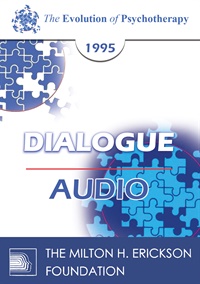
- Average Rating:
- Not yet rated
- Topic Areas:
- Dialogues | History of Psychotherapy | Psychotherapy
- Categories:
- Evolution of Psychotherapy | Evolution of Psychotherapy 1995
- Faculty:
- Donald Meichenbaum, PhD | Salvador Minuchin, MD
- Duration:
- 58 Minutes
- Format:
- Audio Only
- Original Program Date:
- Dec 16, 1995
- Short Description:
- Dialogue 10 from the Evolution of Psychotherapy 1995 - The Future of Therapy, featuring Donald Meichenbaum, PhD; and Salvador Minuchin, MD.
- Price:
- $15.00 - Base Price
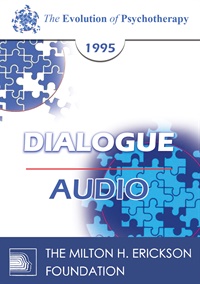
- Average Rating:
- Not yet rated
- Topic Areas:
- Dialogues | Psychotherapy
- Categories:
- Evolution of Psychotherapy | Evolution of Psychotherapy 1995
- Faculty:
- Miriam Polster | Jeffrey Zeig, PhD
- Duration:
- 1 Hour
- Format:
- Audio Only
- Original Program Date:
- Dec 16, 1995
- Short Description:
- Dialogue 11 from the Evolution of Psychotherapy 1995 - Heroism, featuring Miriam Polster, PhD; and Jeffrey K Zeig, PhD.
- Price:
- $15.00 - Base Price
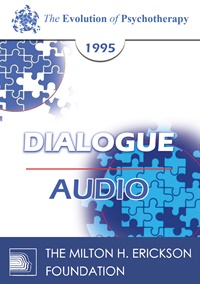
- Average Rating:
- Not yet rated
- Topic Areas:
- Dialogues | Psychotherapy
- Categories:
- Evolution of Psychotherapy | Evolution of Psychotherapy 1995
- Faculty:
- Jay Haley, MA | Thomas Szasz, MD
- Course Levels:
- Master Degree or Higher in Health-Related Field
- Duration:
- 56:54
- Format:
- Audio Only
- Original Program Date:
- Dec 16, 1995
- Short Description:
- Dialogue 12 from the Evolution of Psychotherapy 1995 - The Process of Change, featuring Jay Haley, MA; and Thomas Szasz, MD.
- Price:
- $15.00 - Base Price
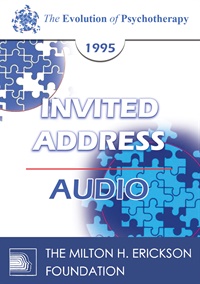
- Average Rating:
- Not yet rated
- Topic Areas:
- Invited Addresses | Rational Emotive Behavior Therapy (REBT) | History of Psychotherapy | Psychotherapy
- Categories:
- Evolution of Psychotherapy | Evolution of Psychotherapy 1995
- Faculty:
- Albert Ellis, PhD | Aaron Beck, MD
- Duration:
- 1 Hour 19 Minutes
- Format:
- Audio Only
- Original Program Date:
- Dec 13, 1995
- Short Description:
- My own physical disabilities as well as my performance anxiety during my childhood and adolescence impelled me to read many ancient and modern philosophers who had worked on the philosophy of human happiness and unhappiness. Thinking about their views and adapting them to my own life, I made myself distinctly less disturbed as well as less disturbable.
- Price:
- $15.00 - Base Price
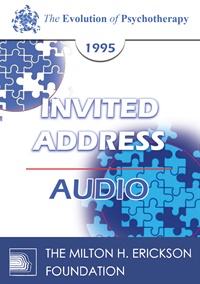
EP95 Invited Address 01b - The Evolution of a Cognitive Behavior Therapist - Donald Meichenbaum, PhD
- Average Rating:
- Not yet rated
- Topic Areas:
- Invited Addresses | Cognitive Behavior Therapy (CBT) | History of Psychotherapy | Psychotherapy
- Categories:
- Evolution of Psychotherapy | Evolution of Psychotherapy 1995
- Faculty:
- Donald Meichenbaum, PhD | William Glasser, MD
- Course Levels:
- Master Degree or Higher in Health-Related Field
- Duration:
- 1:31:51
- Format:
- Audio Only
- Original Program Date:
- Dec 13, 1995
- Short Description:
- The development of cognitive-behavior therapy parallels major developments in how to conceptualize the role of cognition in psychopathology and behavior change. Dr. Meichenbaum will trace his "personal journey" as a clinician and researcher, noting the altering views of cognition from a behavioral, information processing and constructive narrative perspective. He will examine the therapeutic and research implications of this shift.
- Price:
- $15.00 - Base Price
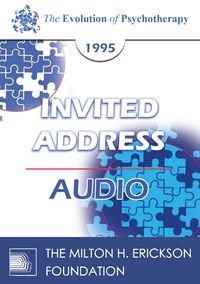
- Average Rating:
- Not yet rated
- Topic Areas:
- Invited Addresses | Bioenergetics | Mind-Body | Psychotherapy
- Categories:
- Evolution of Psychotherapy | Evolution of Psychotherapy 1995
- Faculty:
- Alexander Lowen, MD | Judd Marmor
- Duration:
- 1 Hour 31 Minutes
- Format:
- Audio Only
- Original Program Date:
- Dec 13, 1995
- Short Description:
- The split in the modern personality is between the head and the body, between the rational mind and irrational gut feelings. It reflects the split in this culture between science and the natural forces in life and nature which science attempts to control. The modern individual lives largely in his head and is out of touch with his body because he had deadened it to suppress the fear, the pain and the despair which he experienced in childhood.
- Price:
- $15.00 - Base Price
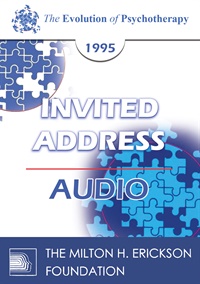
- Average Rating:
- Not yet rated
- Topic Areas:
- Invited Addresses | Psychotherapy
- Categories:
- Evolution of Psychotherapy | Evolution of Psychotherapy 1995
- Faculty:
- Thomas Szasz, MD | Paul Watzlawick, PhD
- Duration:
- 1:24:29
- Format:
- Audio Only
- Original Program Date:
- Dec 13, 1995
- Short Description:
- In the ancient world, the philosopher was a physician of the soul who, employing the healing word (iatroi /ogoi), offered counsel to persons perplexed by problems in living. After the triumph of Christianity, the priest as confessor-counselor replaced the philosopher as rhetorician of consolation. With the birth of psychiatry, and especially since the Freudian revolution, we call helping persons with words "psychotherapy." I shall try to show that without a decisive separation of rhetorical healing from medical healing, psychotherapy as the secular cure of souls is doomed to extinction.
- Price:
- $15.00 - Base Price
Tags: Psychotherapy Thomas Szasz
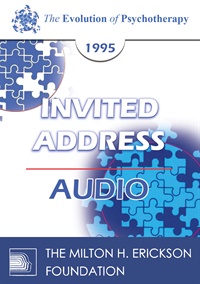
- Average Rating:
- Not yet rated
- Topic Areas:
- Invited Addresses | Family Therapy | Psychotherapy | Relationships
- Categories:
- Evolution of Psychotherapy | Evolution of Psychotherapy 1995
- Faculty:
- Cloe Madanes, HDL, LIC | James Bugental, PhD
- Course Levels:
- Master Degree or Higher in Health-Related Field
- Duration:
- 1:27:24
- Format:
- Audio Only
- Original Program Date:
- Dec 13, 1995
- Short Description:
- Madanes will present guidelines for the positive use of shame in couples and families. Stories from therapy will be told to reveal complicated problems in which shame, sex, power and love are interconnected. Looking at extreme cases of violence will throw light on when it is appropriate to experience shame and how to recover from the pain that shame represents.
- Price:
- $15.00 - Base Price
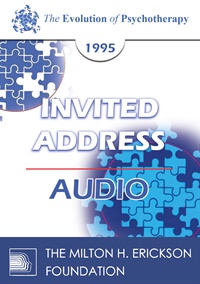
- Average Rating:
- Not yet rated
- Topic Areas:
- Invited Addresses | History of Psychotherapy | Psychotherapy
- Categories:
- Evolution of Psychotherapy | Evolution of Psychotherapy 1995
- Faculty:
- Jay Haley, MA | Mary Goulding, MSW
- Duration:
- 1 Hour 20 Minutes
- Format:
- Audio Only
- Original Program Date:
- Dec 13, 1995
- Short Description:
- In the 1990's all factors of therapy are changing. The way of financing therapy is changing, there are new types of clientele, there are striking differences in ideology and the training of therapists is becoming a new kind of enterprise.
- Price:
- $15.00 - Base Price
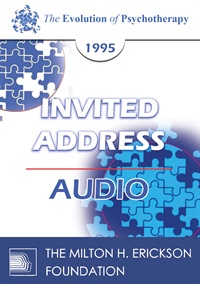
- Average Rating:
- Not yet rated
- Topic Areas:
- Invited Addresses | Ericksonian Hypnosis and Therapy Techniques | History of Psychotherapy | Psychotherapy | Therapist Development
- Categories:
- Evolution of Psychotherapy | Evolution of Psychotherapy 1995
- Faculty:
- Jeffrey Zeig, PhD | Otto Kernberg, MD
- Duration:
- 1 Hour 25 Minutes
- Format:
- Audio Only
- Original Program Date:
- Dec 14, 1995
- Short Description:
- Methods for training therapists customarily are directed to developing cognitive abilities. Using Milton Erickson as a model, an alternate, experiential approach is offered. The "evoking style" of the therapist determines the outcome of the treatment more than the theoretical and clinical methods to which the therapist ascribes.
- Price:
- $15.00 - Base Price
Please wait ...

